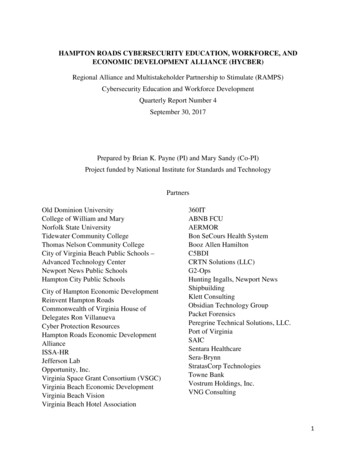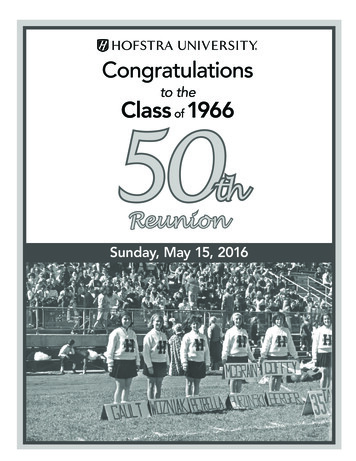
Transcription
HAMPTON ROADS CYBERSECURITY EDUCATION, WORKFORCE, ANDECONOMIC DEVELOPMENT ALLIANCE (HYCBER)Regional Alliance and Multistakeholder Partnership to Stimulate (RAMPS)Cybersecurity Education and Workforce DevelopmentQuarterly Report Number 4September 30, 2017Prepared by Brian K. Payne (PI) and Mary Sandy (Co-PI)Project funded by National Institute for Standards and TechnologyPartnersOld Dominion UniversityCollege of William and MaryNorfolk State UniversityTidewater Community CollegeThomas Nelson Community CollegeCity of Virginia Beach Public Schools –Advanced Technology CenterNewport News Public SchoolsHampton City Public SchoolsCity of Hampton Economic DevelopmentReinvent Hampton RoadsCommonwealth of Virginia House ofDelegates Ron VillanuevaCyber Protection ResourcesHampton Roads Economic DevelopmentAllianceISSA-HRJefferson LabOpportunity, Inc.Virginia Space Grant Consortium (VSGC)Virginia Beach Economic DevelopmentVirginia Beach VisionVirginia Beach Hotel Association360ITABNB FCUAERMORBon SeCours Health SystemBooz Allen HamiltonC5BDICRTN Solutions (LLC)G2-OpsHunting Ingalls, Newport NewsShipbuildingKlett ConsultingObsidian Technology GroupPacket ForensicsPeregrine Technical Solutions, LLC.Port of VirginiaSAICSentara HealthcareSera-BrynnStratasCorp TechnologiesTowne BankVostrum Holdings, Inc.VNG Consulting1
SummaryThe Hampton Roads Cybersecurity Education, Workforce, and Economic Development Alliance(HRCyber) received funding from the National Institute for Standards and Technology as part ofNIST’s Regional Alliance and Multistakeholder Partnership to Stimulate (Ramps) CybersecurityEducation and Workforce Development program. The funded project began October 1. Thisreport covers the activities of HRCyber since that date. These activities included: Monthly alliance meetingsSurvey results and final reportHRCyber partner survey/azimuth checkWebsite updatesArticulation agreementsVirginia Space Grant Consortium activitieso Cyber Saturdayso Career Counselor Workshopso Career videoso Industry Internshipso DACUM finalizedHigh School InternshipsTrain academic advisors on cybersecurity programsIdentify curricula revisionsHRCyber Workforce and Economic Development SummitEach of these activities is summarized below. This is followed by a discussion of expandedactivities and plans for the next 90 days.Monthly Alliance MeetingsHRCyber held monthly meetings in July, August and September. The July meeting was ourmid-project meeting and was in-person. We provided a mid-project report to all participants aspart of this meeting. We also were pleased to Daniella Santos, NICE Program Manager attendand participate in this meeting. Our August and September meetings were held byteleconference. The meetings were well attended. Our July meeting had over 50 attend and theteleconferences average 15 participants.Information discussed at each meeting included HRCyber accomplishments and future plans.Each meeting included time for open discussion so the HRCyber partners could share their ownongoing activities and needs. Copies of the slides presented are available upon request.Survey results and final reportAs part of the project we conducted a series of focus groups and two surveys – one completed onregional cybersecurity employers and one completed on cybersecurity educational institutions.2
A final report was provided to all our stakeholders at the July 2017 meeting. See attachment Afor a copy of this report.HRCyber Partner Survey/Azimuth CheckIn July we completed a survey of all our partners and stakeholders to gain insight in how theyfelt we were progressing along in meeting our project objectives. A total of 27 out of 110responded to this survey. 85% said that we are meeting our objectives. We also asked if theyfelt that HRCyber was having an impact in the region and 29% rated us at having a “significant”impact and 62.5% rated us as having a “moderate” impact. 89% of respondents said that theybelieved that the initiative started with HRCyber should continue after the NICE grant fundingends in December 2017. See attachment B for a complete report on this survey.Website UpdateA website was created in an effort to generate awareness about alliance and its activities. Theaddress of the website is: http://securitybehavior.com/hrcyber/. Material on the website wasupdated on an as needed basis over the past quarter. Information on the website includes currentevents, news stories, links to alliance partners, cybersecurity resources, and a link to ourHRCyber Workforce Needs Survey. Future updates will be provided as accomplishments occur.Articulation AgreementsDuring the past year we completed two articulation agreements between Old DominionUniversity and Tidewater Community College and Thomas Nelson Community College. Theseagreements allow students in the AAS in Information Systems Technology-Cyber Securityprogram to transfer to the BS in Interdisciplinary Studies with a Cybersecurity major. Theseagreements saves the student over 50 credit hours of course work. ODU is also in the finalstages of finalizing a third articulation agreement with Northern Virginia Community College.These articulation agreements are expected to start producing transfers starting in spring 2018.Virginia Space Grant Consortium ActivitiesThe Virginia Space Grant Consortium is a co-partner for this project and they have beeninstrumental in completing several key activities during the past 12 months. We have provideddetails on these activities in previous reports but we want to highlight them one more time.Cyber Counselor WorkshopThe Cyber Counselor Workshop was held at the ODU Peninsula Center in Hampton, Va. onFebruary 23, 2017. Twenty-seven school counselors, career coaches, Career and TechnicalEducation (CTE) teachers from the Hampton Roads region attended. During the program,presenters representing our higher education academic partners (Thomas Nelson CommunityCollege, Tidewater Community College, Norfolk State University, and Old DominionUniversity) provided information specific to their academic settings on education pathways3
leading to a career in cybersecurity. In addition, presenters from two of our industry partners(Sentara Healthcare and Newport News Shipyard) presented an excellent picture of the state ofthe cybersecurity job market in the local area. Local school partners from Newport News PublicSchools, Hampton City Public Schools, and Virginia Beach Public Schools participated in apanel discussion outlining their school districts’ current state of cybersecurity courses insecondary schools. Workshop participants also took part in an engaging hands-on, DumpsterDiving/Identity Theft activity. Finally, participants provided suggestions for improving the fivepart cyber security career awareness video series that VSGC is developing.Thomas Nelson Community College Hosted Cyber SaturdayOn March 11th, Thomas Nelson Community College (TNCC) hosted our first Cyber Saturdayprogram for high school students and their parents. Forty-three students and twenty-two parentsattended the event. Students participated in such activities as Raspberry Pi from Scratch (led byHampton City Public Schools teacher), Footprinting and Port Scanning (Newport NewsShipyard), Exploring LAN Technologies (TNCC), Cyber Physical Systems (ODU), Wi-FiPassword Cracking (ODU), and an exciting drone competition (VSGC). While the students wereengaged in those activities, parents attended sessions led by the FBI (Norfolk Branch), SentaraHealthcare, admissions information and education pathways (TNCC), and VSGC programs.Parents also participated in the Dumpster Diving/Identity Theft activity led by TNCC.Tidewater Community College Hosted Cyber SaturdayOn March 25th, VSGC led the second Cyber Saturday event held at the Advanced TechnologyCenter in Virginia Beach hosted by Tidewater Community College (TCC). Forty-nine highschool students and nineteen parents attended the exciting event. Industry partners (PacketForensics and Newport News Shipyard) and academic partners (TCC, Old Dominion University,Virginia Beach Public Schools) led the students in such activities as Wi-Fi Password Cracking,Capture the Flag, Foot Printing and Port Scanning, and Cyber Physical Systems (including thedrones again!). Parents held a wonderful question and answer session with a representative fromone of our industry partners (Sera-Brynn), and TCC representatives spoke to admissionsprocedures and cybersecurity programs at the community college. Afterwards, parents were ableto join the students in their classrooms. Volunteers from Virginia Beach Public Schools and theComputer Club at TCC as well as others helped with the event.Cyber Video SeriesFive videos are currently in production. These videos have been shared at the Cyber CounselorWorkshop and the two Cyber Saturday events. Edits based on the feedback from these groupsare being made. Videos should be released within the next two weeks after partners have had theopportunity to view the final product. Overall, 19 interviews were conducted. Partnersinterviewed for the video series included NIST, NASA Langley Research Center, PeregrineTechnical Solutions, Packet Forensics, G2-Ops, AERMOR, Newport News Shipyard, SentaraHealthcare, and Langley Federal Credit Union. Each video is approximately 10 minutes in4
length. Topics include Cybersecurity – The Big Picture; Career Pathways; Accessing theCybersecurity Job Field; The Cybersecurity of Things; and Protecting and Serving.Industry InternshipsThrough the VSGC’s Commonwealth STEM Industry Internship program, we continue theprocess of reaching out to and scheduling meetings with each of the member HRCybercompanies as well as some of the academic partners. We are also assisting with CSIIPregistrations and determining specific needs for targeted recruitment for ideal student candidatesfor the internships. We have provided a number of cyber security classroom and informationsessions with students and faculty from Hampton Roads schools and others, member and nonmember. Per the proposal, we anticipate at least 10 internship placements for summer 2017. Todate we have now placed eight students with Dan Bowden and Sentara Healthcare. We are alsoworking very closely with APEX as well in partnership with Sentara. For many of the othercompanies we have met with, we are in the process of obtaining specific requirements for theirprospective interns and reaching out to students who may be interested.Developing a Curriculum (DACUM)As noted in the December quarterly report. The DACUM panel meeting was held on December13-14, 2016 in Hampton. Coordinated by VSGC and hosted by Thomas Nelson CommunityCollege, the panel identified the tasks and duties for cybersecurity professionals in the HamptonRoads region. Ten currently working cybersecurity professionals from different employmentsectors met and discussed their daily work and tasks. Led by a certified DACUM Facilitator, thedeliverable from the panel discussion will be a DACUM chart for early career cybersecurityprofessionals. The DACUM chart was finalized in February and provided in previous reports.This DACUM chart will inform and serve as a guide to curriculum development and otherproject components.High School InternshipsVirginia Beach City Public Schools’ Technical and Career Education department createdindustry internships for high school students enrolled in ATC classes for Cybersecurity &Network Administration, CISCO Networking, Computer Systems Technology, and Software &Game Development. These internships are professionally and financially supported byHRCyber. Up to 20 VBCPS high school students will have the opportunity to experience 30hour cybersecurity internships in the cybersecurity field through this partnership. Currentcommunity partners include NEXCOM, ABS Technology, AECOM, Klett Consulting, andG2Ops, SAIC, Clark Nexsen, and Endurance IT Services. Participating companies will workwith ATC teachers to outline a plan of study for assigned interns. Internship students are in theirjunior or senior year of high school, have or are pursuing certification, and come from one ofthree programs: Network Administration and Cyber Security, Cisco Network Engineering, andComputer Systems Technology. All of the internships will be completed by the end ofNovember 2017.5
Train academic advisors on cybersecurity programsTraining for 40 academic advisors on the work that HRCyber is doing in the region witheducational institutions and on cybersecurity academic programs available at Old DominionUniversity was completed on September 29, 2017 as part of the Old Dominion Advisor Networkconference. During this training information was provided on how HRCyber is working withregional educational institutions from high schools, community colleges and universities inexpanding the availability of internships as part of cybersecurity degree programs and on thedevelopment of articulation agreements between ODU and Tidewater Community College,Thomas Nelson Community College and the recently completed agreement with NorthernVirginia Community College. The degree plan for ODU’s Interdisciplinary StudiesCybersecurity major was reviewed with all advisors.Identify curricula revisionsA workshop was held on April 7, 2017 with the educational partners to discuss tools availablefor reviewing their cybersecurity curricula to meet workforce needs. Information regarding theDACUM chart and the results of the cybersecurity surveys were provided for use in reviewingand revising curricula. Faculty and staff routinely review their course curricula to see howcybersecurity modules can be added.Virtual LabThe ODU cybersecurity virtual laboratory provides a secure and user-friendly environment fordistance learning students to remotely do hands-on labs, which are a critical component of manycybersecurity courses. The enterprise Cisco routers, switches, and security appliances in thelaboratory provide comprehensive protection for the laboratory as well as shield the campusnetwork from accidental cyber attacks. The high-end workstations together with the Cisconetworking gears enables to create not only virtual networks, but also real world networkenvironments connected by physical routers and switches, to emulate highly realistic cyberattack and defense. Various hands-on labs, from the entry-level labs to advanced, comprehensivelabs, have been developed and deployed in the virtual laboratory, supporting the cybersecuritycourses currently offered by ODU.To provide seamless access for our partners in HR Cyber Alliance to the ODU virtual lab, wehave worked with ODU ITS (Information Technology Service) to upgrade the equipment in thelab. ODU guest accounts have been created for a list of faculty of TNCC and TCC. The partnersare able to utilize only web browsers to log in their ODU guest accounts. The virtual lab can beseamlessly accessed from their guest accounts. Training on the capabilities of the lab has beenprovided to TNCC and TCC faculty and additional training will be completed as needed.STEM Trifecta Challenge.Members of HRCyber served as judges in the STEM Trifecta Challenge in June 2017. Over1,000 students from every school in the City of Virginia Beach participated in this annual event.6
HRCyber provided 500 to the winning Cybersecurity Challenge Team with two teams tied forfirst place – Advanced Technology Center and Ocean Lakes High School.Workforce Summit Planning. We are finalizing our planning for our October 27, 2017HRCyber Workforce and Economic Development Summit. This is one of the last majoractivities we have to complete as part of this project. See attachment C for the draft program andagenda for this conference.Future ActivitiesOver the next ninety days, we will continue to complete all related activities associated with thisproject. This primarily includes planning and conducting a Cybersecurity Workforce andEconomic Development summit on October 27, 2017. We are also co-sponsoring ThomasNelson Community College regional cybersecurity conference on October 13, 2017 andparticipating in the NICE Conference in early November.Additional ActivitiesOver the past three months, a number of additional activities that were not described in ourproposal have been completed as a result of our participation in the RAMPS initiative. Theseadditional activities include: Thomas Nelson Community College received designation from NSA as a NationalCenter of Academic Excellence in Cyber Defense Two-Year Education.Faculty at Old Dominion University submitted two additional proposals focused oncybersecurity related issues.o The Engineering Management and Systems Engineering researchers wereawarded 115,000 through The National Security Agency Cybersecurity CoreCurricula Development Grant to develop a course in cybersecurity riskmanagement to support the President’s Cybersecurity National Action Plan.o The Department of Electrical and Computer Engineering was awarded a threeyear, 360,000 NSF Research Experience for Undergraduates (NSF REU)program. This grant will provide 10 undergraduate students from across thecountry with research opportunities in cybersecurity during the 10-week summerprogram.The HRCyber team joined forces with a team of individuals planning to seek statefunding as part of the Virginia Initiative for Growth and Opportunity(www.govirginia.org). The effort is focusing on workforce development, research anddevelopment, and collaboration in the region and across the Commonwealth of Virginia.Concluding RemarksBy all indications, our project continues it trajectory of success. We have accomplished all ofour major activities with the exception of our Summit which is scheduled for October 27, 2017.7
Additional, we are investigating ways for this initiative to continue after the NICE grant iscompleted in December 2017 and based on our Partner Azimuth Check the vast majority of ourpartners and stakeholders believe that this initiative needs to continue as this is an area ofpotential growth for this region.8
Attachment A: Final Data Report – Submitted by the Social Science Research Centerat Old Dominion University toThe Hampton Roads Cybersecurity Education, Workforce, and Economic DevelopmentAlliance (HRCyber)July, 2017
IntroductionThe Social Science Research Center (SSRC) at Old Dominion University collaboratedwith the Hampton Roads Cybersecurity Education, Workforce, and EconomicDevelopment Alliance (HRCyber) to provide data collection and evaluation support tothe project. The SSRC conducted focus groups with business and educationrepresentatives and used that feedback to develop surveys for businesses andeducational partners to assess the workforce needs of cybersecurity companies inHampton Roads. Finally, the SSRC met with small groups of the educational partnersto discuss the placement rate of cyber students into the workforce and other relatedissues. The information from those data collection efforts are presented in this finalreport.Focus GroupsFocus groups were conducted with interested individuals who were attending theVirginia Beach Cyber Convention and Expo on October 6th, 2016 and the Cyber ThreatConference held at Thomas Nelson Community College on October 7th, 2016.Approximately 15-20 people attended each session. Focus group participantsrepresented a variety of perspectives including local government, smaller and largercyber companies, college students, the shipyard, Department of Defense, and highereducation. The basic summaries for each question asked can be found in theAppendix. Below is a general summary of the more substantive questions.Recruitment EffortsParticipants were asked how their company typically recruits cybersecurityprofessionals. The responses seemed to favor direct interpersonal contact withpotential candidates or through personal networks. Common responses included:recruiters, college fairs, internship programs, veteran sources such as transitionassistance program (TAP) classes for the military, direct referrals, and networking withinpersonal networks. Other “traditional” methods such as job boards or classifiedpostings were deemed by some as not very helpful.Priority Skills/Knowledge AreasParticipants were asked to identify their top three priority skills/knowledge areas whenhiring and/or training cybersecurity employees. The answers were varied and includedthe more technical skills necessary for positions in the cyber field such as priorprogramming experience, experience with vulnerability assessment, risk management,network detection and analysis, and penetration testing. However, other more basicskills were also mentioned including the need for lifelong learners who are passionateabout cybersecurity, technical/proposal writing skills, soft skills/communication skills andcustomer service skills, and a general knowledge of how IT relates to businessgoals/strategies. These responses indicate the diverse nature of the skills andknowledge that businesses are seeking in their cyber employees.Final Data Report – HRCyber2
Difficulty in Finding Qualified ApplicantsFocus group participants were asked how difficult it was to find applicants with the skillsand knowledge that they mentioned previously. The general consensus was that it isdifficult for a variety of reasons. Some of the non-DOD participants shared thatconventional recruitment methods do not always work and they have to rely on personalnetworks to hire. Others reported seeing “paper tigers” – these are applicants whoappear to have the necessary qualifications/certifications but they cannot actuallyperform the specific job tasks and requirements.Participants from local municipalities reported not being able to compete with salariesoffered by private firms or DOD. This results in local governments becoming a trainingground with high turnover. Those from DOD reported needing people with securityclearances. The “perfect candidates” would have a 4-year degree, but also the handson skills, the certifications and the clearances. Finally, many participants agreed thatmany applicants with the necessary technical/cyber skills do not have goodcommunication skills.Educational Programs and Preparing the Cyber WorkforceParticipants were asked how well the local educational programs were meeting theirneeds for a prepared cyber workforce. They were also encouraged to share what elsethey would like local educational institutions to know about their workforce needs. Theneed for training in specific areas included: Risk managementVulnerabilities in programmingPenetration testingCertificationsUnderstanding the software development cycleParticipants also shared the need for different mixture of skills or knowledge. Applicantsare needed who can do more than one thing – particularly for employers that cannotpay for large IT departments or for specialists in every area. Many are looking for“geeks” or hackers but not necessarily needing those who are formally educated. Someparticipants pointed out that there are courses for which no one at the college/universityis qualified to teach. Another mention was that coders need to also understandhardware.For DOD, their needs are driven by the requirements in the contracts and so it would behelpful it educational partners were familiar with some of those general requirements.Other basic or soft skills were mentioned including: being able to facilitatecommunication between the board, IT department and programmers and how to workas a team.Other specific recommendations for educational programs included: startingtraining/introducing skills at the public school level to get students interested early,Final Data Report – HRCyber3
hosting/organizing hacking conferences or hack-a-thons, giving credit for internships,putting cyber into the general IT curriculum, including security in all CS programs.Finally, some participants mentioned the importance of the NIST framework and studentaccess to security clearances.Business and Educational Partner Web SurveysThe feedback from the focus groups was used to inform questions and responseoptions for web-based surveys of business representatives and educational partners.The information from the surveys will help develop educational pathways from the publicschools through community colleges, four-year institutions and continual professionaldevelopment that will provide a capable and fully trained cybersecurity workforce forHampton Roads. The survey was disseminated to over 200 business contacts askingabout the cybersecurity workforce and their recruitment and hiring needs. Businesseswere also encouraged to share the survey link with other business contacts who rely onthe cybersecurity workforce. The educational survey was sent to 35 educationalcontacts in Hampton Roads.Business Survey SummaryEmail invitations to complete a survey of cyber workforce hiring needs were sent tobusiness contacts in November, 2016. By February 20, 2017 a total of 34 businessrepresentatives completed the survey. The Appendix includes tables and charts for thesurvey results. This section will summarize some of the survey highlights.The respondents to the business survey represented private/for-profit companies(64.7%), federal, state, and municipal government (26.5%), and not-for-profitorganizations (8.8%). The business respondents came from various industriesincluding cybersecurity, education, insurance and local government. Respondents heldprimary positions such as cybersecurity manager/administrator (23.5%), CEO/CFO(11.8%) and IT manager/administrator (8.8%).Final Data Report – HRCyber4
Regarding recruitment methods, the survey results support what was found in the focusgroups. Personal/direct referrals are among the most effective as reported by 41% ofbusiness representatives while more traditional methods such as classified ads werenot a top effective method.Final Data Report – HRCyber5
The 34 business representatives shared information on the number of current vacanciesin their company for specific positions. Below are the total number of current vacanciesreported for each position type. Cybersecurity analysts, engineers and consultantsseem to be the most commonly reported vacancies for the responding businesses.PositionTotal Current VacanciesCybersecurity Analyst27Cybersecurity Engineer22Cybersecurity Consultant21Cybersecurity Specialist/Technician16Cybersecurity Architect15Incident Analyst/Responder15Cybersecurity Manager/Administrator12Penetration and Vulnerability Tester11Cybercrime Analyst/Investigator6IT Auditor5The information on vacancies is generally consistent with the feedback from businessrepresentatives about the hardest positions to fill. Cybersecurity analyst (33%) andengineer (48%) ranked among the most commonly mentioned as hard to fill. More thanone in five business respondents (22%) also mentioned cybersecurity architect,penetration and vulnerability tester and cybersecurity specialist and technician asamong the hard to fill positions. IT auditor (4%) and incident analyst/responder (4%)were selected by a lower percentage of businesses as hard to fill. Cybersecurityconsultant was also not frequently selected as difficult to fill yet it was third-highest interms of number of current vacancies.Final Data Report – HRCyber6
Business representatives were asked to rate the importance of certain skills andknowledge. The survey results were fairly consistent with the focus groups results inthe variety of skills and their importance ratings. Risk management (82%), networking(79%) and network detection and analysis (79%) were among the technical skills mostoften selected as at least somewhat important. However, general problem solving(94%), communication skills (94%), and writing skills (85%) were among the more basicskills that were rated as important – in higher percentage than the more technical skills.Final Data Report – HRCyber7
Businesses were also asked to identify the most difficult knowledge skills to find inapplicants. Once again, some of the more basic skills were mentioned as often (if notmore) than the technical skills including communication skills (32%), general problemsolving (21%), and understanding the business environment (18%). Penetration testing(21%), CISSP certification (21%), and security clearances were selected among themost difficult skills to find – which is consistent with the focus group results.Final Data Report – HRCyber8
Businesses were asked to rate the quality of cybersecurity education available from theeducational institutions in Hampton Roads. Public schools received no “excellent”ratings while 21% of businesses described the education from community colleges asexcellent. Only 8% describing local four-year colleges and universities as excellent.More than half of business representatives (54%) described the quality of educationfrom colleges/universities as good, compared to 38% rating community colleges and21% rating local public schools as good. Public schools received the highestpercentage of businesses rating them as “poor” at 29% compared to 8% for communitycolleges and 13% of four-year colleges/universities.Final Data Report – HRCyber9
Education/TrainingRate the quality of cybersecurity educationavailable from educational institutions inHampton ic School33%8%25%13%Community Colleges4-Year Colleges/UniversitiesBusiness representatives were asked how well local educational institutions preparedstudents in various categories based on the NIST framework. The majority ofbusinesses responded “fair” to most categories with two-thirds (67%) responding fair tothe recovery category (maintaining plans for resilience and restoringcapabilities/services that were impaired due to a cybersecurity event). More than half(57%) responded fair to the respond category (developing/implementing the appropriateactivities to take action for a detected cyb
University and Tidewater Community College and Thomas Nelson Community College. These agreements allow students in the AAS in Information Systems Technology-Cyber Security program to transfer to the BS in Interdisciplinary Studies with a Cybersecurity major. These agreements saves the student over 50 credit hours of course work.










